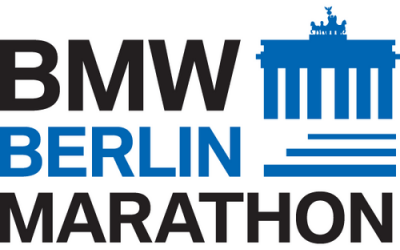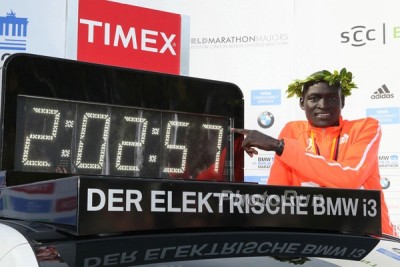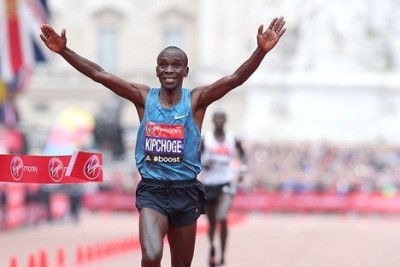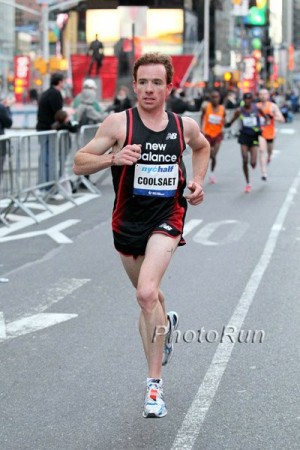2015 BMW Berlin Marathon Men’s Preview: Will the World Record Fall (Again)? What About The 39-Year Old Canadian Record? Will An American Break 2:10?
By LetsRun.com
September 25, 2015
Fall marathon season is here, and in what’s becoming an annual tradition, it will open with a world record attempt on the streets of Berlin on Sunday. In 2013, it was Wilson Kipsang (he was successful). Last year, it was Dennis Kimetto (he was too). Now the third member of marathoning’s current “Big Three,” Eliud Kipchoge, will attempt to run the fastest marathon in history. He’ll be joined by 2014 runner-up and fellow Kenyan Emmanuel Mutai — who would have broken the world record last year had Kimetto not beaten him to it — and 2012 Berlin champ Geoffrey Mutai, whose 2:03:02 personal best is second in history only to Kimetto (though that mark is not record-eligible).
Those three are the headliners, and though there is some talent behind them (2:04 man Feyisa Lilesa, World XC 6th-placer Tamirat Tola), the quality drops off rather sharply. None of the very Americans will race here, but Shadrack Biwott, Sean Quigley, Gabe Proctor and Matt Llano – all guys dreaming of the Olympic team in 2016 – are all entered and will be looking to PR.
We give you the need-to-know details for Sunday’s race below (it starts at 3 a.m. ET if you want to watch live, though Universal Sports will show a replay at 1 p.m. ET) followed by a preview of the men’s race.
What: 2015 BMW Berlin Marathon
When: Sunday, September 27, 3 a.m. ET (9 a.m. local time)
Where: Berlin, Germany
How to watch: You can stream it live starting at 3 a.m. ET on UniversalSports.com or watch it tape-delayed on Universal Sports Network at 1 p.m. ET.
Prize money: 40,000 Euros ($45,152) for the winner down to 2,000 Euros ($2,257) for 10th. 30,000-Euro ($33,864) time bonus for first man under 2:04; 15,000-Euro ($16,932) bonus for first and second men under 2:05. 50,000-Euro ($56,440) world record bonus.
Abbott World Marathon Majors
The Abbott World Marathon Majors consists of eight major marathons — Tokyo, Boston, London, Berlin, Chicago, New York, the World Championships and the Olympics — with the winner of each series taking home $500,000. Starting this year, the AWMM changed its format so that each series lasts a year plus one race. So the current series began at the 2015 Tokyo Marathon and will conclude at the 2016 Tokyo Marathon.
The scoring is as follows:
1st: 25 points
2nd: 16 points
3rd: 9 points
4th: 4 points
5th: 1 point
Athletes can only score in two events per cycle. If there’s a tie for first, the tiebreakers are, in order: 1) Head-to-head record in AWMM events; 2) Most wins. If they’re still tied after that, the race directors of the AWMM will vote for the champion, though they can choose to split the title if they feel that’s fair (we assume that’s what they’ll do if two athletes finish with the maximum 50 points).
The current standings are as follows:
1. Yemane Tsegay, Ethiopia, 32 points
2. Eliud Kipchoge, Kenya, 25 points
2. Ghirmay Ghebreslassie, Eritrea, 25 points
2. Endeshaw Negesse, Ethiopia, 25 points
2. Lelisa Desisa, Ethiopia, 25 points
6. Wilson Kipsang, Kenya, 16 points
6. Stephen Kiprotich, Uganda, 16 points
Tsegay is on top by virtue of runner-up finishes in Boston and at Worlds, but he could be overhauled by several men between now and Tokyo 2016. The only man in Berlin with any points in the current AWMM series is Eliud Kipchoge, who banked 25 with his win in London in April. Kipchoge doesn’t guarantee himself the series win with a victory in Berlin, but if he wins he’ll almost certainly earn at least a split of the $500,000 grand prize. If Kipchoge sets the world record on Sunday, there’s a strong possibility he’ll earn the full $500,000 as even if another athlete ties him at 50 points, Kipchoge will have a win in London (the best field of any marathon) and a world record. No one can beat that resume. If Kipchoge finishes third or better, he’ll move into the lead after Berlin.
Important links: LRC 2014 Berlin Marathon coverage * Berlin Marathon live results page * Race website
Will the world record go down again?
That’s the question on everybody’s mind heading into Sunday’s race. The flat, fast Berlin course has proved perfect for fast times (the WR has gone down there in five of the past eight years) but every time the mark is lowered — Dennis Kimetto chopped 26 seconds off last year to put it at 2:02:57 — the chances of another world record diminish. A record requires a lot of moving parts, and if any one of them are off — the weather, the pacing — that can scuttle the attempt quickly.
But Berlin has made its name on controlling those variables, and even the weather seems to cooperate each year, with a high of 63 degrees and low of 42 projected for Sunday, per Weather.com (with the gun going off at 9 a.m., it should be in the 50s for much of the race). And if you were to pick anyone in the world to go after the record, Kipchoge would be your man. The average of his five career marathon times is 2:04:42, a time which would rank him #1 in the world this year (coincidentally, Kipchoge is currently ranked #1 after running — you’re not going to believe this — 2:04:42 to win in London in April) and he’s coming off a victory over the two previous record holders, Wilson Kipsang and Dennis Kimetto, in London. Kipchoge managed 2:04:05 on this course two years ago; now he’s stronger and more experienced.
He also should be all-in on the record attempt. With the Olympics presumably on his mind next summer (making Berlin logistically impossible), Kipchoge would have to wait until he’s 32 for another crack at Berlin. That’s hardly old for a marathoner, but Kipchoge will have a lot of miles on his legs by then. Remember, he’s been competing internationally since 2003, when he stunned Kenenisa Bekele and Hicham El Guerrouj to win global 5,000 gold in Paris.
However, even if Kipchoge arrives in Berlin in the shape of his life, breaking 2:02:57 is far from assured. After Berlin last year, we pointed out that, according to the equivalency charts produced by LetsRun.com stat/coaching guru John Kellogg, the marathon world record is now better than the world records at 5,000 and 10,000 (2:02:57 is equivalent to 12:34 and 26:11 according to JK). There’s still room for improvement (Kimetto’s 5k splits weren’t exactly even — 14:42, 14:42, 14:46, 14:26, 14:32, 14:30, 14:09, 14:42) but it will take a truly spectacular performance from Kipchoge to better 2:02:57.
The biggest variable may not be the weather or the rabbits. It may be a man, a man named Emmanuel Mutai. One of the biggest reasons Kimetto was able to push so hard last year and split a ridiculous 14:09 from 30k to 35k to ensure the record was that he had Mutai pushing him the whole way. Even after the rabbits dropped out at 30k, Mutai hung with Kimetto for another eight kilometers before Kimetto pushed on alone for the final 4.2k. Running world record pace by yourself requires tremendous mental effort and if Kipchoge is alone when the rabbits drop out, it’s going to be much harder to push his body to the limit than it would be if he had Mutai there with him.
Of course Mutai, who ran 2:03:13 here last year, can’t be discounted as a threat to the world record either (despite running just 2:10:54 for 11th in London in April) and if comes down to just him and Kipchoge, he’s got a fighting chance. Unfortunately for Mutai, history doesn’t favor him in a one-on-one duel: he has seven runner-up finishes at World Marathon Majors to just one victory.
Neither Kipchoge nor Mutai — the only two men in the field who could conceivably break the record (yes, we’re counting out Geoffrey Mutai) — has raced since London, so we’ll have to wait until Sunday morning to see exactly what kind of shape they’re in. But both have spoken about how they want the win and the world record and if the two men come to the line willing to push each other for 26.2 miles, we could see a world record for the third straight year.
| [gravityform action=”polls” id=”265″ mode=”poll” cookie=”1 month” show_results_link=”false” display_results=”true” percentages=”true” counts=”false” ajax=”true”] |
The Field
| Name | Country | PB | Comment |
| Geoffrey Mutai | Kenya | 2:03:02 | ’12 champ DNFed London in April and hasn’t run good marathon since Nov. ’13 |
| Emmanuel Mutai | Kenya | 2:03:13 | Mr. Near-Miss was 2nd last year in 2:03:13; 11th in London in April |
| Eliud Kipchoge | Kenya | 2:04:05 | World’s hottest marathoner has won 3 straight marathons (’14 Rotterdam, ’14 Chicago, ’15 London) |
| Feyisa Lilesa | Ethiopia | 2:04:52 | ’11 WC bronze medalist was 4th in Dubai and 5th in Rotterdam so far in ’15 |
| Eliud Kiptanui | Kenya | 2:05:39 | 5th last year; 7th in Seoul in March |
| Tamirat Tola | Ethiopia | 2:06:17 | 6th at World XC; 8th in last marathon in Gongju (S. Korea) in Oct. ’14 |
| Lusapho April | South Africa | 2:08:32 | ’13 NYC 3rd-placer was 13th in Boston in April |
| Masanori Sakai | Japan | 2:09:10 | PR’d in Tokyo last year but hasn’t raced at all in 2015 |
| Tomoyuki Morita | Japan | 2:09:12 | 15th in Tokyo in February (2:11:41) |
| Koji Gokaya | Japan | 2:09:21 | 27-year-old PR’d by over 2 minutes in Tokyo in Feb. |
| Yared Shegumo | Poland | 2:10:34 | Euro silver medallist was 4th in Lodz Marathon in April |
| Rafael Iglesias | Spain | 2:10:44 | |
| Scott Overall | Great Britain | 2:10:55 | ’12 Olympian was top Brit at London in April (13th) |
| Reid Coolsaet | Canada | 2:10:55 | Ran 2:11:24 in Rotterdam in April; could he take down 40-year-old Canadian record (2:10:09)? |
| Michael Shelley | Australia | 2:11:15 | Commonwealth Games champ was 12th in London |
| Pablo Villalobos | Spain | 2:12:21 | |
| Jean Habarurema | France | 2:12:40 | |
| Shadrack Biwott | USA | 2:12:55 | Former UO star has PR’d in all three career marathons, most recently ’14 Frankfurt |
| Andre Pollmacher | Germany | 2:13:05 | |
| Sean Quigley | USA | 2:13:30 | PR’d in last marathon in Fukuoka last year |
| Falk Cierpinski | Germany | 2:13:30 | |
| Gabe Proctor | USA | 2:13:45 | Ran 2:13:45 in his second career marathon in Chicago last year |
| Julian Flugel | Germany | 2:14:20 | |
| Matt Llano | USA | 2:16:13 | 61:47 half marathoner was 2nd in USA Marathon Champs in LA in March |
| Philipp Pflieger | Germany | Debut |
We discussed Kipchoge and Mutai above and unless they both blow up trying to run the world record, one of them will be your winner, with Kipchoge the obvious pick based on his three-marathon win streak. There are several other men with fast PBs in the field, Geoffrey Mutai notably among them, but you have to be really fast to win in Berlin. Take a look at the PBs of the men who won the past eight races:
| Year | Winner | Time | PB prior to race |
| 2014 | Dennis Kimetto | 2:02:57 WR | 2:03:45 |
| 2013 | Wilson Kipsang | 2:03:23 WR | 2:03:42 |
| 2012 | Geoffrey Mutai | 2:04:15 | 2:03:02 |
| 2011 | Patrick Makau | 2:03:38 WR | 2:04:48 |
| 2010 | Patrick Makau | 2:05:08 | 2:04:48 |
| 2009 | Haile Gebrselassie | 2:06:08 | 2:03:59 |
| 2008 | Haile Gebrselassie | 2:03:59 WR | 2:04:26 |
| 2007 | Haile Gebrselassie | 2:04:26 WR | 2:05:56 |
Quite simply, Berlin is where the world’s best marathoners come to run fast. If you don’t step on the line in world-record shape or close to it, you’re not winning in Berlin. Based on their performances in the last year, Kipchoge and Emmanuel Mutai are the only men in the field who have shown they’re capable of that. Even if you take everyone else in the field at peak shape, only Geoffrey Mutai would realistically have a shot at it. But Mutai turns 34 next month and bombed out of his last marathon in London. His two marathons in 2014 weren’t impressive either. An American marathoner would kill for a 2:08:18 (6th) in London and 2:13:44 (6th) in New York, but when you’re a four-time major champ, those performances don’t cut it. By his standards, Mutai has run one good marathon since the start of 2013 — his victory in New York in November 2013. We’re not saying he’s finished internationally, but it’s time to stop giving him the benefit of the doubt. He needs to show something before being considered a threat to win another major.
Beyond that, Feyisa Lilesa (5th in Rotterdam in 2:09:55, 4th in Dubai in 2:06:35) is the only other sub-2:05 guy in the field, and the next-fastest guy, Eliud Kiptanui (7th in Seoul in March) hasn’t shown much. Tamirat Tola has run 27:22 (track) and 60:08 this year and was 6th at World Cross, so he could so something in Berlin, but he’s not going to run 2:03. The only way one of these guys wins is if the top two blow up.
The Americans
If you’re an American, you run Berlin for one reason: to PR. Well make tha two reasons in 2016. To PR and get an extra two weeks to train for the 2016 US Olympic Trials. Chicago offers a flat course, easier travel and more prize money for Americans but the course still isn’t as fast as Berlin, and perhaps most importantly, it’s two weeks from now which gives you less time to get ready for the Trials on February 13th.. Shalane Flanagan eschewed the major American marathons to chase the American record in Berlin last fall, and though she fell short, she was still rewarded with a 48-second PR. Shadrack Biwott, Sean Quigley and Matt Llano will hope for similar success as all three will fly across the Atlantic to test themselves in the German capital. Gabe Proctor isn’t listed in the media guide but appears to be running according to this Runner’s World article (the subject of that piece, Llano, isn’t in the media guide either).
Biwott owns the best PB at 2:12:55 (he ran that in Frankfurt last year, another fast German course). His races in 2015 haven’t been mind-blowing (63:08 at the downhill Rock ‘n’ Roll San Diego Half Marathon in May; 63:09 for the win at the Garry Bjorklund Half in June) but he’s gotten faster in every marathon he’s run (2:20:28 at 2011 LA to 2:13:26 at 2013 Twin Cities to 2:12:55 last year in Frankfurt). Quigley is also coming off a PR in his last marathon, running 2:13:30 in Fukuoka last fall.
The American with the best chance to PR on Sunday is Llano, simply because it should be a lot easier for him to lower his 2:16:13 PR than it will be for the others to run 2:12/2:13. The 27-year-old Llano has run 61:47 for the half marathon, so bettering 2:16 shouldn’t be much of a problem. The only thing that could stop him is if he goes out way too hard for the first half, and that’s a definite possibility from a guy who spoke about going after Ryan Hall‘s American debut record of 2:08:24 before Chicago in 2014 (Llano ran 2:17:43).
Runner’s World’s Peter Gambaccini has a good piece on Llano that went up on Wednesday, and in it Llano says that he thinks he has a 2:10 in him.
“I’m not really afraid of failure,” Llano told Gambaccini “I’m going to put it out there and I’m going to go for it, and if it pans out, great, and if it doesn’t, I’ll go for it somewhere else. It’s a barrier I want to get at some time in my career.”
It’s going to take 2:10/2:11 ability to make the US Olympic team (Llano will run the Trials in February) but even if Llano figures out his fueling issues — he claims he didn’t take any fluids until mile 20 in Chicago — 2:10 is a huge leap for a 2:16 guy, even when you factor in Llano’s strong half marathon pb and the fast Berlin course. Llano’s PR is a little misleading (he ran it in hot conditions at the US Marathon Champs in LA in March, where he was second among Americans) but a lot of Americans have tried to run 2:10 in recent years and fallen short. We’ll see on Sunday if he — or any of the other Americans in Berlin — have what it takes.
Want more on Llano? You can read his training log here or talk about his chances on the messageboard here: MB: Good article on Matt Llano living and training with Shalane Flanagan as he prepares for Sunday’s Berlin Marathon
Will the Canadian Record Become Masters-Eligible?.
The North American most likely to run 2:10 on Sunday isn’t Llano or any of the other Americans. It’s Canada’s Reid Coolsaet, who has run between 2:10:55 and 2:11:24 four times. Coolsaet, 36, views Berlin as his last, best chance at a PR, and considering he ran 2:11:24 in Rotterdam in April despite battling an injury to his peroneus muscle in his leg in the weeks prior to the race, he’s definitely got a shot. His most recent race, 64:09 for second at the Edmonton Half Marathon on August 23, was solid, but not quite what Coolsaet wanted, according to his post-race recap on his blog.
“My endurance felt fine and my leg speed lacking,” Coolsaet wrote. “That’s a good place to be 5 weeks out from Berlin. Enough time to work on ‘speed’ while maintaining endurance.”
If Coolsaet can run faster than 2:10:09, he’ll break the longstanding Canadian national record, held by Jerome Drayton. Drayton ran that time in Fukuoka on December 7, 1975, and though three Canadians have broken 2:11 since then, Drayton’s mark has stood the test of time (we wrote more about the record and Coolsaet’s pursuit of it in April). If Coolsaet doesn’t get it in Berlin, Drayton’s mark should turn 40 years old in December — a rare masters-eligible record.
One thing working in Coolsaet’s favor: Canadian records have been dropping like flies this year. Cam Levins took down the 10,000 record in May and Mo Ahmed broke the 17-year-old 5,000 record two weeks ago in Brussels. Can Coolsaet cap a banner year by breaking the oldest of them all on Sunday?
Discuss the race in our fan forum: 2015 Berlin M Preview: Will the WR fall (again)? Will the 39-year old Canadian record? What about the 4 Americans?
| [gravityform action=”polls” id=”265″ mode=”poll” cookie=”1 month” show_results_link=”false” display_results=”true” percentages=”true” counts=”false” ajax=”true”] |
| [gravityform action=”polls” id=”267″ mode=”poll” cookie=”1 month” show_results_link=”false” display_results=”true” percentages=”true” counts=”false” ajax=”true”] |




